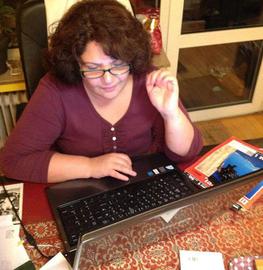In this series on self-censorship, we asked writers, artists, journalists and human rights activists to define self-censorship. Where possible, they were invited to give examples of their experiences, and to describe what they have witnessed.
We presented each interviewee with the same set of questions, adapting them or asking further questions where relevant.
Our intention was for the interviewees to express their own perspective of self-censorship.
***
Golnaz Ghabraei is an Iranian literary critic and translator. She comes from Langarood, a small coastal town on the shores of the Caspian Sea. After receiving her high school diploma during the 1979 Islamic Revolution she enrolled at the University of Rasht, but when authorities shut down the universities amidst the the so-called Cultural Revolution, she returned to her birthplace and married. She tried to live within and endure the post-revolutionary environment, but in 1985, when she was 24, Golnaz and her husband gave up and emigrated to Germany with their children. She has been living there for more than 30 years.
How do you define self-censorship?
Self-censorship is having a sprawling Ministry of Culture and Islamic Guidance in your brain that consistently supervises you, your thoughts and your behavior day and the night. Frustrations, setbacks and lack of self-confidence make this ministry mightier.
Its foundations are laid when you are a little child. When a child notices that things go better if she hides her true feelings and thoughts, when she sees that they want her to refrain from laughing loudly, sit somewhere quietly, obey the grownups, respect the guests even if she detests them — then she starts to build a loveable and family-approved self. The other self, the one that is unruly, mischievous and sometimes pesky, goes somewhere and hides in a foxhole to occasionally escape that Ministry of Guidance and prance around for a short while. And, of course, she pays the price for it.
The more costly the price for showing your true self, the more the true self retreats until you cannot recognize it anymore. Sometimes the true self is lost forever.
Is self-censorship an example of social misconduct or prudence?
It depends on what we mean by misconduct. Censorship hurts other people but self-censorship’s primary victim is oneself — call it whatever you like. We constantly torture ourselves when we systematically hide our own thoughts and actions. And the more we are aware of what we are doing the more we torture ourselves.
In recent years, [since] the internet has allowed us to communicate with friends and, most importantly, with old compatriots, I found a better chance to go over the past. With this review I came to the conclusion that self-censorship in small towns is much more intense than in big cities. Almost all friends that pour out their hearts to me ask me to keep it to myself, even though they mostly talk about very ordinary, everyday things.
Hiding a big part of life’s reality saps you of a horrendous amount of energy. It leaves no time for thinking and creativity. And what is the use when, in the end, we have to present our views in some other way? This dread of revealing the most banal secrets tears you down. Here, you can no longer call it misconduct. It is paralysis of the mind. In such an environment you only talk about trivial things like recipes for weight loss or weight gain. I have seen many people who are reluctant to talk about the past. They do not want to remember the past that they have lived.
Our assumption is that Iran is a self-censoring society. Is this self-censorship rooted in Iranian culture or in its history and political events?
Unquestionably both culture and history are tightly tied to self-censorship and both are created in the context of a series of political events. I think the price we have paid after revealing our true feelings and thoughts have played an important part in establishing this self-censorship.
Look, we had this poet, Forough Farrokhzad, who was more true to herself than the rest of the writers and the poets of her generation. But we are still reluctant to come to terms with her letters and we are more insistent on hiding these letters than she was. Even though many of us admire her, I sometimes think that we wish she was a little different and observed certain boundaries.
Here we must not ignore the role of religion. Religion has immutable laws and a believer would say that he has faith with his whole body and soul, meaning that he has given in to self-censorship. In many cases observing religious rules and laws means suppressing and ignoring your own self, your own desires and your own wishes — only, and only, because of faith. If we let go of something because of moral reasons then have done it with our eyes open and with good reasons, not because an internalized command center orders us what to do and what not to do.
So I think self-censorship is more widespread in every aspect of life in societies where religious laws are imposed by the government or by public opinion, because a believer must suppress that part of himself that is not compatible with his faith.
Here I am mostly talking about everyday life, not self-censorship in the domain of literature. I believe that somebody who is constantly self-censoring cannot free himself from do’s and don’ts when he picks up a pen or engages in any other creative and artistic activity.
Can you give us an example of when you have practiced self-censorship?
Like everybody else, my internal Ministry of Culture and Islamic Guidance, with all its sprawling offices, is active all the time. For years I have bamboozled myself by giving it different names like respecting others, caution, avoiding discord and tension, and a thousand other things.
When I first started translating I found that I was doing everything possible to wrap whatever was in my mind in a guise that would not disturb anybody. The more I got to know this characteristic inside me the more I felt its footprints in my everyday life. I learned that true artistic creativity is impossible unless you close up this Ministry of Culture. I found up that sometimes to be honest with yourself and with others you have to pay a price.
For myself, I can say that perhaps I have closed up a couple of offices of my private Ministry of Culture. At least now, perhaps, I know better than before when I am telling my true self to keep quiet, and this might not be a bad start after all.
visit the accountability section
In this section of Iran Wire, you can contact the officials and launch your campaign for various problems

























comments